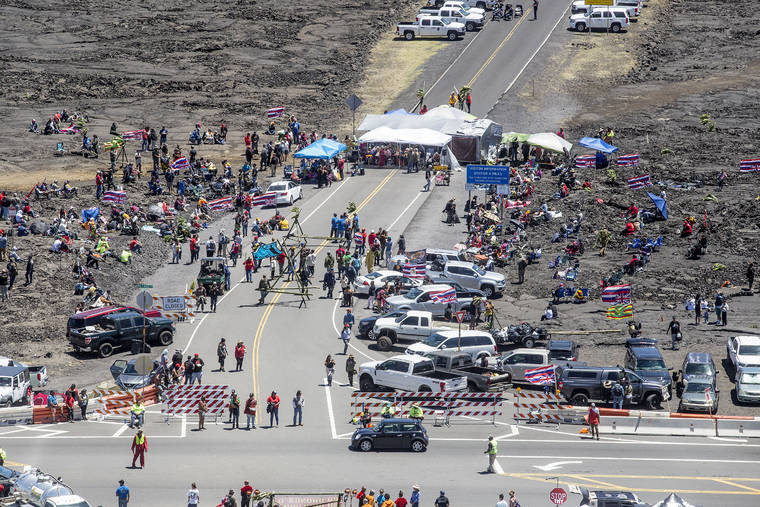Plaintiffs in a lawsuit against the state over its management of land around the Maunakea Access Road are seeking partial summary judgment in the case.
The lawsuit, filed in February by the Native Hawaiian Legal Corporation, argues the departments of Transportation and Land and Natural Resources have used the more than 65 acres of land around the Maunakea Access Road illegally and without providing compensation for decades.
According to the complaint, the state failed to obtain authorization from the Department of Hawaiian Home Lands or the Hawaiian Homes Commission to build the Maunakea Access Road on DHHL land in 1964. Therefore, subsequent use of the land has been unlawful, and the DHHL has failed in its duties to act exclusively in the interests of its beneficiaries, the lawsuit argues.
The plaintiffs in the suit are Big Island Hawaiian community leaders Pualani Kanakaole Kanahele, Edward Halealoha Ayau and Kelii W. Iaone Jr.
Iaone and Kanahele were among more than 30 Hawaiian elders, or kupuna, arrested on July 17, 2019, during the months-long occupation of the access road by people protesting the planned construction of the Thirty Meter Telescope. Ayau is a former DHHL employee who resigned his position in 2019 during a meeting of the Hawaiian Homes Commission, in protest of DHHL’s failure to act in its beneficiaries’ interest regarding the access road.
The motion filed July 13 asks the Oahu judge to declare that defendants Department of Transportation Director Jade Butay and Department of Land and Natural Resources Director Suzanne Case breached their trust obligations and violated the Hawaiian Homes Commission Act of 1920 by asserting control over Hawaiian home lands underlying the MKAR and using the same without compensation and that those defendants are liable for breach of the Hawaiian home lands trust.
Further, it asks the court declare that control of Hawaiian home lands underlying the Maunakea Access Road rests solely with members of Hawaiian Homes Commission and to find that the 6.27-mile road is not a state or public highway.
The court is also asked for a declaration that Hawaiian Homes Commission members Patricia Kahanamoku-Teruya, Randy Awo, Pauline Namuo, Zachary Helm, Dennis Neves, Michael Kaleikini, Russell Kaupu and David B. Kaapu (DHHL Defendants) breached their trust obligations and violated the Hawaiian Homes Commission Act by failing to redress the state departments’ interference with the commission’s exclusive control and their rent free use of the access road.
“Defendants have breached their well-settled fiduciary duties in dealing with the trust lands on Mauna Kea. State Defendants have not complied with their duties to the Hawaiian home lands trust in accordance with the HHCA. DHHL Defendants have not acted to protect the interests of the trust beneficiaries by allowing the use of trust land without explicit agreement or compensation. As such, Plaintiffs are entitled to the relief they seek in this motion,” reads Attorney Alan T. Murakami’s memorandum in support of the motion for partial summary judgment.
The motion also notes that should plaintiffs’ prevail that they “reserve right to seek appropriate remedy, including inductive relief and damages,” but it doesn’t allude to any dollar figure or specific remedies sought.
First Circuit Court Judge Lisa W. Cataldo is set to take up the motion during a hearing via video conference on Tuesday in Honolulu. A partial summary judgment is a request by a litigant for summary judgment on some but not all claims or causes of action. The court previously denied a defense motion to dismiss the complaint on May 8.
The Department of the Attorney General in a motion of opposition filed Monday said the plaintiffs don’t meet their burden to prove summary judgment is entitled.
Deputy Attorney General Ryan K. P. Kanakaole argued the state has not waived its sovereign immunity with respect to the access road because while Act 395 of the 1988 legislative session authorized private suit to force provisions of the Hawaiian Home Commission Act it included an exemption for “any existing projects, programs or any other governmental activities, which are continuing, and which were begun, completed or established prior to July 1, 1988.”
Further, Act 14 in 1995 barred all actions against the state and its officials, including uncompensated use of Hawaiian home lands for state road claims and highways.
In addition, the plaintiffs haven’t exhausted all remedy under Chapter 673 because a contested case hearing before the commission, which is a “threshold prerequisite for bringing suit under that chapter,” was not sought.
“Even if their claims were not barred as a matter of law, Plaintiffs fail to explain, much less prove, that the State breached it trust obligations by placing control of MKAR with DOT. They offer no explanation, much less evidence, as to how the Hawaiian home lands trust is harmed unless DHHL — an agency with no police power, mission or special funding to regulate, repair, or maintain public roads — wrests control over MKAR from the very agency empowered to ensure safe public transportation,” Kanakaole wrote.
The Native Hawaiian Legal Corporation declined comment prior to Tuesday’s hearing. The Attorney General’s office didn’t respond to a request for comment as of press-time Thursday.






